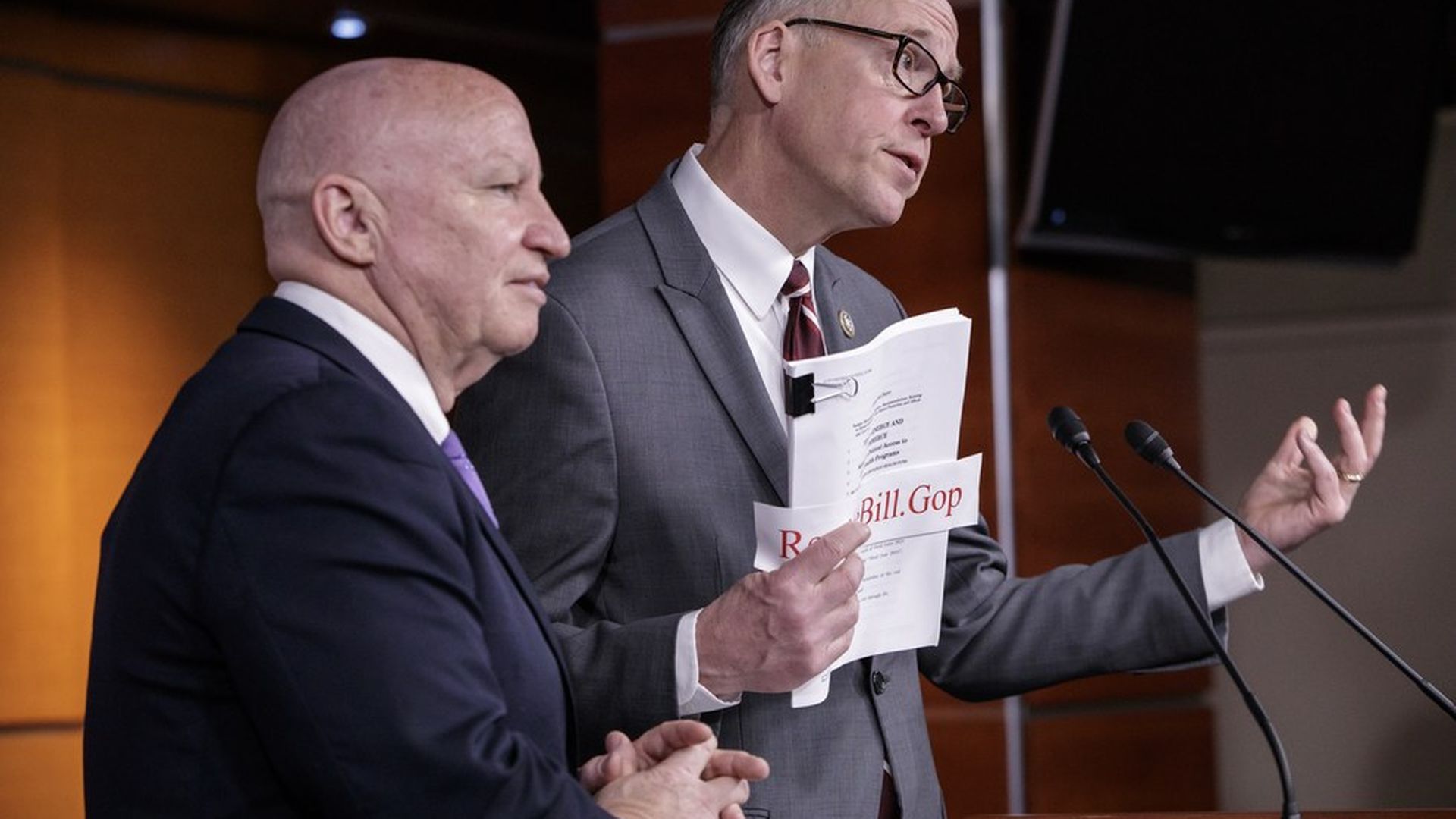"Obamacare Lite" is not a totally inaccurate description of GOP bill
Add Axios as your preferred source to
see more of our stories on Google.

J. Scott Applewhite / AP
It didn't take long for conservative groups to start calling the GOP's Obamacare replacement bill "Obamacare Lite." But as much as establishment Republicans hate the term, conservatives do have a point.
Conservatives are upset about the underlying principles of the bill being too similar to those of Obamacare. But the thing is, legislative reality — as well as politics — means almost all of Obamacare's market reforms and consumer protections will remain intact. Even GOP aides acknowledge that.
Which means yes, the Republican bill is making major spending and revenue reforms within the existing Obamacare regulatory system. And that's what has conservatives so upset. But the bill will undoubtedly make the spending, tax and coverage pieces of the bill much more conservative.
What pieces of Obamacare stay: A lot, including almost all of the consumer protections and market reforms. Here's some of what's staying in place:
- Protections for pre-existing conditions. Insurers still won't be able to deny sick people coverage, and they won't be able to charge them more than healthy people.
- Children will be able to stay on their parents' plan until age 26.
- No lifetime or annual limits on insurance coverage.
- Private plans must cover a set of "essential health benefits." (Though they don't have to cover as much of a patient's total health care costs as under Obamacare.)
- There's a limit on out-of-pocket costs passed along to private plan enrollees.
What pieces of Obamacare will either go away or be changed: How health coverage is subsidized and paid for within that regulatory structure.
- The individual and employer mandates are repealed. The individual mandate is replaced with a continuous coverage provision allowing insurers to charge extra to people who didn't keep themselves insured.
- Medicaid expansion is eventually phased out, and the way the federal government funds the program is massively reformed.
- Obamacare's premium subsidies, which are tied to income and the cost of premiums on exchanges, are replaced with an age-adjusted refundable tax credit.
- Nearly all of Obamacare's industry taxes are repealed, along with taxes on high earners. The exception is the Cadillac tax on expensive employer plan benefits, which is delayed until 2025.
- The use of health savings accounts is expanded.
Reality check: This is, by definition, all Republicans can do under the legislative method they're using to repeal Obamacare, called budget reconciliation. They can't touch the regulatory policies that have conservatives so up in arms.
The backlash: "The challenge is the regulatory system is the heart of Obamacare," Dan Holler, a vice president of Heritage Action for America, told me. "The rest was, how can you support this regulatory regime and make sure people can afford coverage?"
With the regulatory provisions still in place, Holler said, Republicans are now the ones in "the position of figuring out how you get subsidies flowing out the door and what form do they take."
Some liberal health wonks agree with the far-right. "It doesn't repeal Obamacare. What it does is repeal a lot of taxes," Tim Jost, a law professor emeritus at Washington and Lee and an Obamacare supporter, told me. He called it "a massive income transfer from the poor to the wealthy. But in terms of changing the regulation of insurance markets, it just doesn't do much."
House GOP leaders are pushing back against the "Obamacare Lite" label — House Ways and Means Committee chairman Kevin Brady calls it "Obamacare Gone." But mainstream Republicans emphasize that Obamacare's regulatory changes are just the new reality we all live in. If conservatives just want to go back to 2009, before Obamacare passed, "that strikes me as a bit of a stretch," said Rodney Whitlock, a former GOP Senate Finance Committee aide.
Of course, the charges of "Obamacare Lite" are driving leadership crazy.
"These are Hobbes-ian conservatives. Life is nasty and brutish and people should make do," one senior GOP aide said of the conservatives throwing around the charge. "But the other 99 percent of us are not that cruel."
